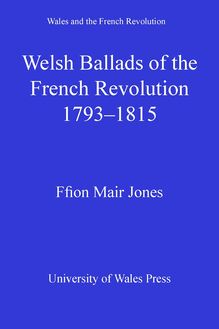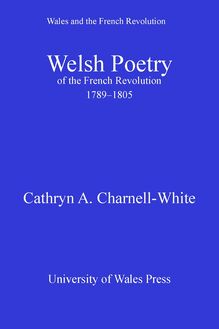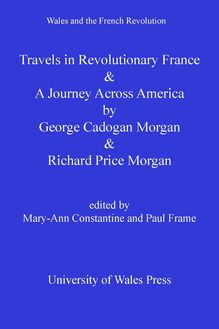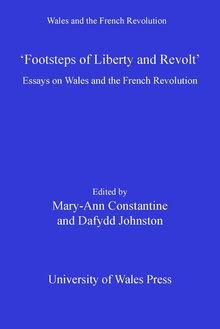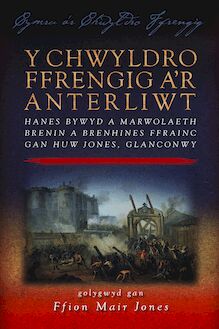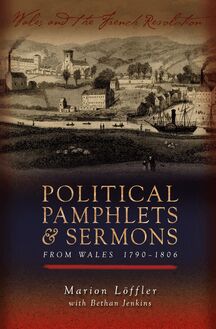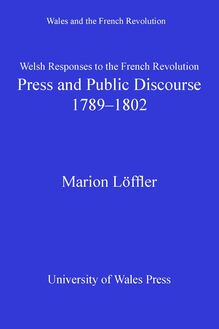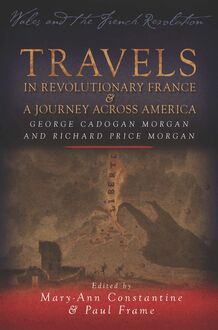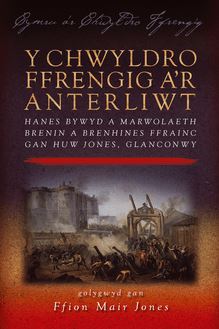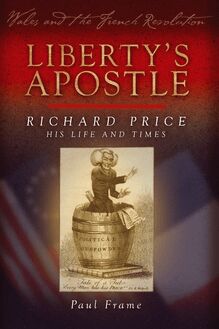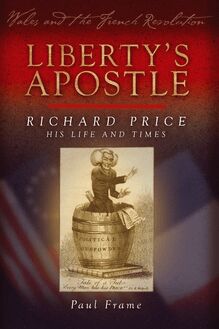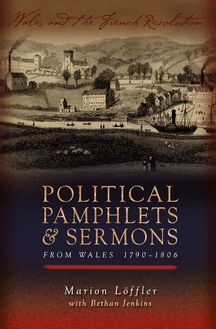-
 Univers
Univers
-
 Ebooks
Ebooks
-
 Livres audio
Livres audio
-
 Presse
Presse
-
 Podcasts
Podcasts
-
 BD
BD
-
 Documents
Documents
-
- Cours
- Révisions
- Ressources pédagogiques
- Sciences de l’éducation
- Manuels scolaires
- Langues
- Travaux de classe
- Annales de BEP
- Etudes supérieures
- Maternelle et primaire
- Fiches de lecture
- Orientation scolaire
- Méthodologie
- Corrigés de devoir
- Annales d’examens et concours
- Annales du bac
- Annales du brevet
- Rapports de stage
La lecture à portée de main
510 pages
English
Découvre YouScribe en t'inscrivant gratuitement
Je m'inscrisDécouvre YouScribe en t'inscrivant gratuitement
Je m'inscris
Obtenez un accès à la bibliothèque pour le consulter en ligne
En savoir plus
En savoir plus
510 pages
English
Obtenez un accès à la bibliothèque pour le consulter en ligne
En savoir plus
En savoir plus

Description
Welsh Ballads of the French Revolution provides for the first time an edition, with parallel English translations, of Welsh-language ballads composed in reaction to the momentous events of the Revolution in France and the two decades of war which followed. Ballad writers were first spurred to respond in 1793, when the French monarchs were executed, France declared war upon Britain, and paranoia regarding the possible threat of internal revolt in Britain reached a crisis point. As the decade proceeded, ballads were sung in thanks for the victory of British forces and local people against an invasion of Pembrokeshire by French troops, and in reaction to key naval battles and to the extensive mobilization of militia and volunteer forces. Scholars working on the British response to the Revolution have showed increasing interest in exploring the contents of ballads and songs. The ballad in particular is seen as a vital source of information, since it represents ordinary people's awareness of the developments of the period. Balladry is also subject to continued research within Welsh scholarship, and this volume, with its focus on a clearly defined historical period and its revelation of new voices within the canon of Welsh ballad writers, will drive this field of study forwards. Regional reactions to the Revolution within the British Isles are also now seen as crucially important, but Wales, partly because of the inaccessibility of material composed in the Welsh language, has repeatedly been omitted from the general picture. This volume aids in rectifying this situation, ensuring (by use of translation, copious contextualizing notes, and a lengthy introduction) that both the ballad genre and Welsh reactions receive the attention they deserve from the wider scholarly community.
Introduction Responding to Revolution The Voices of Dissent: The ballads of south-west Wales (1793) 'Faithful Britons': The loyalist response (1793 - 4) The Fishguard Invasion (1797): Loyalty, identity and the hand of God Taking up Arms: Militia, volunteers and the army (1793 - 1815) War-reporting (1794 - 1815) The Duke of York (1793, 1794) The Glorious First of June and Cape St Vincent (1794, 1797) Nelson ballads (1805) Napoleon ballads (1812 - 15) Conclusion
Introduction Responding to Revolution The Voices of Dissent: The ballads of south-west Wales (1793) 'Faithful Britons': The loyalist response (1793 - 4) The Fishguard Invasion (1797): Loyalty, identity and the hand of God Taking up Arms: Militia, volunteers and the army (1793 - 1815) War-reporting (1794 - 1815) The Duke of York (1793, 1794) The Glorious First of June and Cape St Vincent (1794, 1797) Nelson ballads (1805) Napoleon ballads (1812 - 15) Conclusion
Sujets
Informations
| Publié par | University of Wales Press |
| Date de parution | 15 février 2012 |
| Nombre de lectures | 0 |
| EAN13 | 9780708324622 |
| Langue | English |
| Poids de l'ouvrage | 4 Mo |
Informations légales : prix de location à la page 0,0450€. Cette information est donnée uniquement à titre indicatif conformément à la législation en vigueur.
Extrait
Wales and the French Revolution
Welsh Ballads of the French Revolution 1793–1815
FIon Mair Jones
University of Wales Press
WALES AND THE FRENCH REVOLUTION
General Editors: MaryAnn Constantine and Dafydd Johnston
WALES AND THE FRENCH REVOLUTION
Welsh Ballads of the French Revolution 1793–1815
FFION MAIR JONES
UNIVERSITY OF WALES PRESS CARDIFF 2012
© Ffion Mair Jones, 2012
All rights reserved. No part of this book may be reproduced in any material form (including photocopying or storing it in any medium by electronic means and whether or not transiently or incidentally to some other use of this publication) without the written permission of the copyright owner except in accordance with the provisions of the Copyright, Designs and Patents Act 1988.Applications for the copyright owner’s written permission to reproduce any part of this publication should be addressed to The University of Wales Press, 10 Columbus Walk, Brigantine Place, Cardiff CF10 4UP.
www.uwp.co.uk
British Library CataloguinginPublication Data A catalogue record for this book is available from the British Library.
ISBN 9780708324615 eISBN 9780708324622
The right of Ffion Mair Jones to be identified as author of this work has been asserted by her in accordance with sections 77, 78 and 79 of the Copyright, Designs and Patents Act 1988.
Typeset in Wales by Eira Fenn Gaunt, Cardiff Printed by CPI Antony Rowe, Chippenham,Wiltshire
I Heledd Haf
WALES AND THE FRENCH REVOLUTION
The French Revolution of 1789 was perhaps the defining event of the Romantic period in Europe. It unsettled not only the ordering of society but language and thought itself: its effects were profoundly cultural, and they were longlasting. The last twenty years have radically altered our under standing of the impact of the Revolution and its aftermath on British culture. In literature, as critical attention has shifted from a handful of major poets to the noncanonical edges, we can now see how the works of women writers, selfeducated authors, radical pamphleteers, prophets and loyalist propagandists both shaped and were shaped by the language and ideas of the period. Yet surprising gaps remain, and even recent studies of the ‘British’ reaction to the Revolution remain poorly informed about responses from the regions. In literary and historical discussions of the socalled ‘four nations’ of Britain, Wales has been virtually invisible; many researchers working in this period are unaware of the kinds of sources available for comparative study. The Wales and the French Revolution Series is the product of a fouryear project funded by the AHRC and the University of Wales at the Centre for Advanced Welsh and Celtic Studies. It makes available a wide range of Welsh material from the decades spanning the Revolution and the subsequent wars with France. Each volume, edited by an expert in the field, presents a collection of texts (including, where relevant, translations) from a particular genre with a critical essay situating the material in its historical and literary context. A great deal of material is published here for the first time, and all kinds of genres are explored. From ballads and pamphlets to personal letters and prizewinning poems, essays, journals, sermons, songs and satires, the range of texts covered by this series is a stimulating reflection of the political and cultural complexity of the time.We hope these volumes will encourage scholars and students of Welsh history and literature to rediscover this fascinating period, and will offer ample comparative scope for those working further afield.
MaryAnn Constantine and Dafydd Johnston General Editors
List of Figures Preface Acknowledgements List of Abbreviations
Introduction
Texts and Translations
Contents
xiii xv xix xxi
1
Editorial Principles 77 1793 1. Anon.,‘Y brenin a’r llywodraeth, neu, y Refoliwsion yn 1688 wedi gwneuthur ail Refoliwsion yn afreidiol i’r Brutaniaid’ (The king and the government, or, the Revolution of 1688 having made a second Revolution unnecessary for the Britons) 82
2. Anon., ‘Sylwiad byr ar y papuryn a ddaeth allan yn ddiweddar dan yr enw Ungeiniogwerth o Wirionedd, mewn anerchiad gan Tomas ap Siencyn i’w frawd Siôn, amcan a diben pa un ydoedd ceisio drwgliwio’r Ymneilltuwyr yng ngolwg y werin anwybodus’ (A brief observation regarding the pamphlet which appeared recently under the nameThomas sonaddress by Truth, in an One Pennyworth of of Jenkin to his brother John, the intention and purpose of which was to try and misrepresent the Dissenters in the eyes of the ignorant populace) 92
3. Richard Roberts,‘Ychydig o hanes y g[wrthr]yfel a [fu] rhwng brenin Ff[rainc] [a’i deyrnas ei hun, ac] y to[rasant ei] be[n ef;] ac fel y maent yn a[wr] yn sychedu am waed yr hen Fryt[a]niaid; ond gobeithio y tagant o [s]yched yn gyntaf, ac na chânt mo’u hewyllys arn[om] ni. Duw a safo gy[d]a Brenin George III [a]c Eglwys [L]oegr’ (A little of the history of the insurrection which took place between the king of France and his own kingdom; and that they cut off his head; and how they are now thirsting for the blood of the ancient Britons; but let us hope that they will die of thirst first, and that they will not see their will fulfilled upon us. May God stand with King George III and the Church of England) 100
viii
CONTENTS
4. Edward Pugh, ‘[Cerdd] o ganmoliaeth i’r Duke o’ York, a diolchgarwch i Dduw, am gael y ffafr o orchfygu ein gelynion, sef y Ffrancod’ (A song of praise to the Duke of York, and of thankfulness to God, for granting the favour of vanquishing our enemies, namely the French) 110
5. [?Shôn ap Ifan],‘Ffarwél g{r ieuanc i’w wlad oedd wedi listio i’r armi hefo’r Duwc o’ Yorc’ (The farewell of a young man, who had enlisted with the Duke of York’s army, to his country) 116
1794 6. Anon., ‘Odlau newyddion ar ystyriaeth yr amserau, yn y flwyddyn 1794’ (New rhymes in consideration of the times, in the year 1794) 120
7. Richard Roberts, ‘Ychydig o hanes brenhines Ffrainc; y modd y cafodd ei difetha, sef torri ei phen a rhwymo ei dwy fraich ar ei chefn, Hydref 17, 1793’ (A little of the story of the queen of France; the manner in which she was slain, namely by severing her head and tying her two arms onto her back, October 17, 1793) 124
8. Richard Robert[s],‘[Cerdd newydd] yn gosod allan y moddion am y rhyfel oedd presennol rhyngom a’r Ffrancod, a dull y grefydd babaidd’ (A new song setting out the features of the current wars between us and the French, and the manner of the popish religion) 130
9. Robert Roberts,‘[Cerdd] yn gosod allan wroldeb, ffyddlondeb a llwyddiant y Duke o’ York yn y rhyfeloedd presennol’ (A song setting out the valour, loyalty and success of the Duke of York in the current wars) 138
10. Robert Roberts, ‘[Cerdd] yn rhoddi byr hanes o’r frwydyr ddigyffelyb honno a ymladdwyd ar y môr y dydd cyntaf o Fehefin 1794, yn yr hon y gorchfygwyd y French gan Admiral Lord Howe’ (A song giving the brief history of that incomparable battle that was fought on the sea on the first day of June 1794, in which the French were defeated by Admiral Lord Howe) 144
1795 11. Jonathan Hughes, ‘[Cerdd] o galondid i’r milwyr gwladychaidd yr ydys yn godi yn y deyrnas hon i gadw porthladdoedd, pa rai a elwir yn gyffredin milisia’ (A song of encouragement to the patriotic soldiers that are being raised in this kingdom to protect harbours, who are generally called the militia) 150
1797 12. Anon., ‘Cân newydd am y waredigaeth fawr a gafodd yr hen Frytaniaid trwy law Duw [a] Lord Cawdor, oddi wrth lu o ladron Ff[rein]ig yn y flwydd
-
 Univers
Univers
-
 Ebooks
Ebooks
-
 Livres audio
Livres audio
-
 Presse
Presse
-
 Podcasts
Podcasts
-
 BD
BD
-
 Documents
Documents
-
Jeunesse
-
Littérature
-
Ressources professionnelles
-
Santé et bien-être
-
Savoirs
-
Education
-
Loisirs et hobbies
-
Art, musique et cinéma
-
Actualité et débat de société
-
Jeunesse
-
Littérature
-
Ressources professionnelles
-
Santé et bien-être
-
Savoirs
-
Education
-
Loisirs et hobbies
-
Art, musique et cinéma
-
Actualité et débat de société
-
Actualités
-
Lifestyle
-
Presse jeunesse
-
Presse professionnelle
-
Pratique
-
Presse sportive
-
Presse internationale
-
Culture & Médias
-
Action et Aventures
-
Science-fiction et Fantasy
-
Société
-
Jeunesse
-
Littérature
-
Ressources professionnelles
-
Santé et bien-être
-
Savoirs
-
Education
-
Loisirs et hobbies
-
Art, musique et cinéma
-
Actualité et débat de société
- Cours
- Révisions
- Ressources pédagogiques
- Sciences de l’éducation
- Manuels scolaires
- Langues
- Travaux de classe
- Annales de BEP
- Etudes supérieures
- Maternelle et primaire
- Fiches de lecture
- Orientation scolaire
- Méthodologie
- Corrigés de devoir
- Annales d’examens et concours
- Annales du bac
- Annales du brevet
- Rapports de stage
Signaler un problème
YouScribe
Le catalogue
Le service
© 2010-2024 YouScribe
